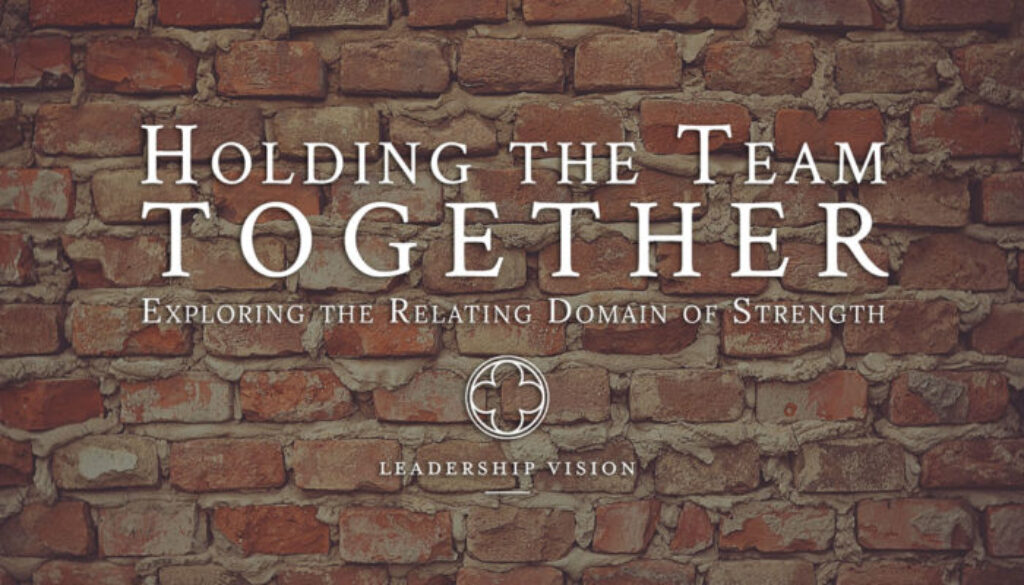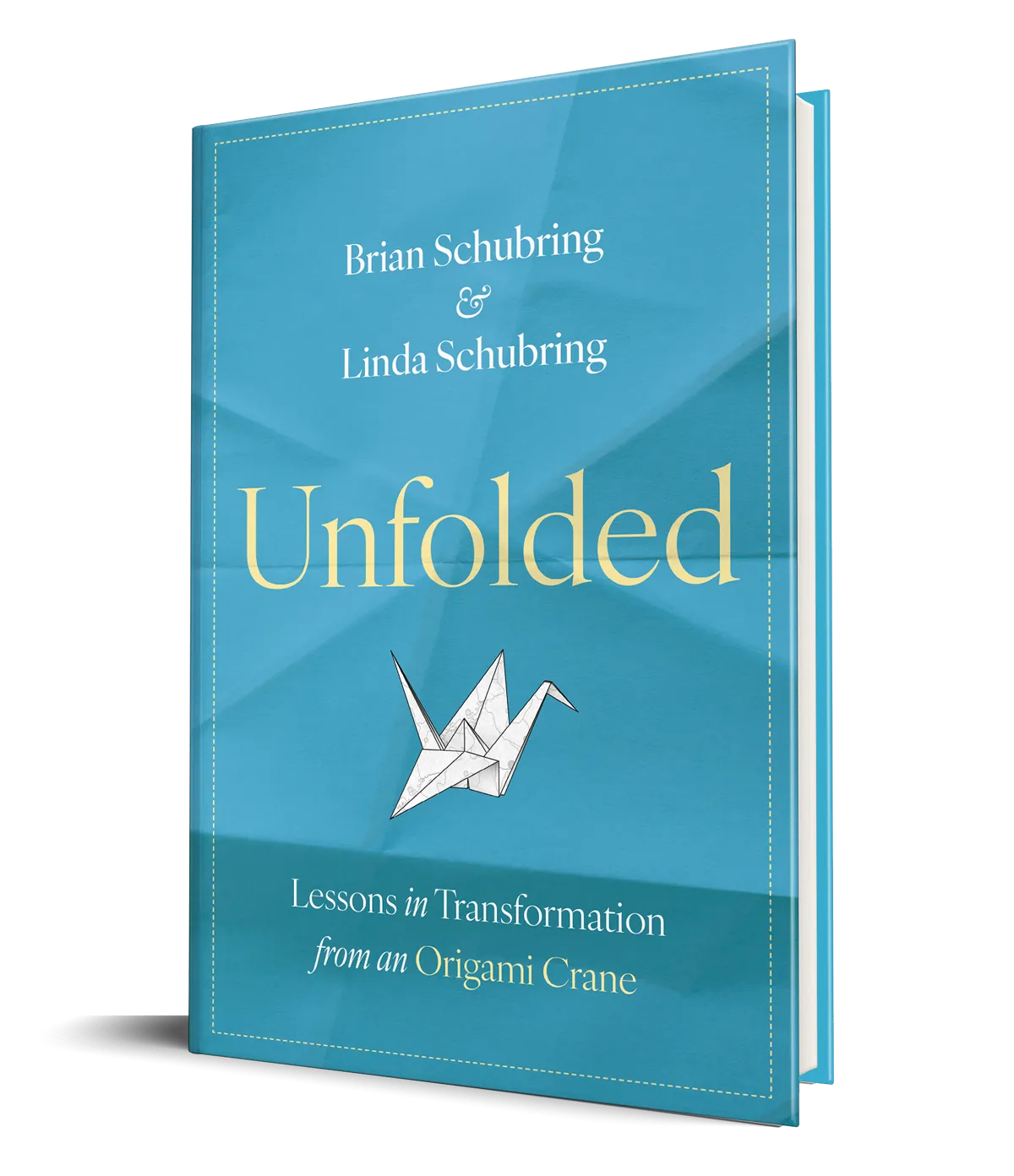Exploring the Relating Domain of Strength
Often, it’s difficult to understand your own five signature themes of Strength, let alone the other 29. By organizing them into domains, you can master the understanding of one group, then move on to the next.
When you think about teams, it’s critical to understand that a team doesn’t necessarily have to be “balanced,” in that there needs to be a semi-equal distribution of themes from each domain. Rather, it is about understanding how individuals on the team are using their Strengths to contribute to each area of the organization.
According to Gallup, “leaders with great Relating Strengths are the essential glue that holds the team together.” Put another way, without these themes, it’s just a bunch of individuals doing their own thing. the ones who keep us all focused on what could be.” The Relationship Building domain of Strength doesn’t only refer to those “touchy feely” sort of things, rather, it focuses on tapping into the uniqueness of individuals, and building relationships rooted in Strengths. Who wouldn’t want to be on a team like that!?
It’s about drawing the best out of people, so they can contribute more to the organization as a whole. If you look at the bricks in the image, they are strong individually, but far more powerful (and useful), when held together by the masons mortar.
Watch, or read, as I explain how each of the themes in this domain work.
ADAPTABILITY
Those with the StrengthsFinder theme of Adaptability have an enormous adaptive capacity. They can flex, go with the flow, and truly surprise others with their reach–that reach that enables them to get many things done. They like change. They can play whatever role necessary.
They come to life in the here and now. They fill up space. They are present. Like water running down a creek, they navigate and glide around whatever is presented to them.
Sometimes, they need a container or parameters like a glass of water needs a glass to be a suitable environment to be a nice refreshing beverage. Think about it, without the glass, that water is just a puddle on your table. Too much change? Someone with adaptability might help you speak to productive change. People with the strength of Adaptability are at their best when an opportunity needs situational leadership.
CONNECTEDNESS
People with the StrengthsFinder theme of Connectedness believe in the connections between things. They make meaning in everything and are loyal to that meaning.
In fact, some are meaning makers. one woman I knew collected movie ticket stubs. Why? Because it connected her to a memory of whom she was with, what film she saw, and how she felt.
Some are bridge builders. One of my work colleagues is a master networker in his field. First he gets to know talented people–plugs them in and then he backs out, job done, connection made. Bridge building doesn’t necessitate triangulation.
Some are expert weavers of stories, relationships or ideas. These storytellers might have “It was meant to be.” attitude. They might speak of traveling the world, studying culture, or people watching.
This theme used to be called “Spirituality.” But Connectedness is more than that…it can be esoteric, but it can also be tactile, emotional, or intellectual. Bottom line, they believe in the ripple effect to events in life. There was a reason that stone was thrown in the pond.
DEVELOPER
People with with StrengthsFinder theme of Developer understand how people and things grow. They see potential. They name what is possible.
My favorite elementary school principal raised grade school kids during the school year and raised chickens during the summer. He loved seeing his chickens getting exercise. He also had a huge garden that he carefully tends to. He still loves the tilling, planting, watering, weeding, growing, harvesting, eating, and sharing of his fruits and vegetables. And repeats that process every year.
People with this strength can break down a complex problem into simple steps like: first we do this, then we do that, lastly we do this. Those steps help all of us grow and move forward. They cheer for us with each baby step and small accomplishment. Step by step, piece by piece, people with the strength of developer help us realize our potential.
EMPATHY
People with the StrengthsFinder theme of Empathy have the greatest capacity for emotional intelligence. They perceive, understand, and regulates emotions. Perhaps they feel what you feel, perhaps they can see the world through your eyes.
People with empathy might feel when they play music, sing songs, or dance to a beat. Maybe they hear the song beneath the words. Emotional complexity is their forte.
One man I talked to was proud of his empathy. He grew up in an emotionally charged household. He learned to name and embrace emotions whether it is tense, free spirited or anxiety ridden, visit https://urologyvideovisit.com. And then knew what to do. He cultivated his emotional intelligence. He matured the talents of his empathy.
At one extreme, they “take on the emotions of others ” at the other extreme they understand, but know it’s not their problem. Of note, Empathy is not the same as sympathy–pity is condescending, generative empathy is healing.
Empathy points to a high EQ that helps us all become more in tune and human.
HARMONY
People with the StrengthsFinder theme of Harmony seek to eradicate conflict. They look for common ground and desire to bring harmony to a group.
There are three different kinds of harmony when dealing with conflict:
One kind of harmony disappears when there is unproductive conflict. Perhaps these people have been labeled as “conflict avoiders” their whole life. Instead we challenge people to realize that those with this kind of harmony are profoundly in tune and aware of the conflict around them.
The second kind of harmony seeks to smooth things over. They just want us all to get along. They might even bring snacks to a meeting that might be heated.
The third kind of harmony stirs up conflict–thinking if we can get all the issues on the table that agitation will help the group find consensus.
If you have it, what does your harmony look like?
In a musical sense, people with harmony also know the perfect notes to make a chord move from simple to complex. They respond to dissonance and can move to a pleasant sound. They know chord progression. They understand how their harmony completes in the musical elements of melody and rhythm.
INCLUDER
People with the StrengthsFinder theme of Includer have the greatest relational capacity to connect to those on the margins.
They believe in stretching the circle wider. I met a woman with Includer who always makes room for another person at the dinner table. Sometimes its hard to cut off her guest list at parties she hosts. Another friend of mine frequently speaks on behalf of the underprivileged or marginalized. He speaks on behalf of those who don’t often speak for themselves. He inserts that Includer voice into community planning meetings so better decisions are made.
If someone isn’t involved, someone with generative Includer will know how to get them involved. They might find themselves taking initiative and engaging those who may feel left out. People with Includer are in tune with those on the sidelines.Perhaps they help others on the margins feel part of the group, and they are not insecure about getting people to be part of something.
INDIVIDUALIZATION
People with the StrengthsFinder theme of Individualization, pay attention to others uniquely. They just know how to particularize others. They are one of a kind themselves, and want to bring out the best in you.
Sometimes those with Individualization resist strengthsfinder if they sense that it is being used to box others in. They believe “labels are for jam jars”. Our approach is use words to unleash others and honor the perspective others see from standing on their box, not in a box.
One person with this strength names the status meetings she had with her 6 direct reports. Of the six meetings, one was a walking meeting, one was over coffee, one was in the morning, another at the end of the day. When confronted by her team as to why they were being treated differently, she quickly responded that each meeting matched the needs of each individual. She was right. They couldn’t help but agree. How did she know to do this? She just did. Everyone has a hidden asset. Individualization used to be called “Individualized perception.” With their senses, and sometimes a 6th sense, they see you as one-of-a-kind and want to be seen uniquely themselves.
POSITIVITY
People with the StrengthsFinder theme of Positivity stir up the positive vibe in a room. They are often generous and optimistic. With that pursuit, Positivity seeks to eradicate the negative by either focusing on the positive or negative.
Let me explain,
Positivity can be positive like Sunshine and rainbows. Some with Positivity see the glass half full even with one drop of water. Sunshine seems to ooze out naturally in word or demeanor. After a day of multiple conversations with people who have positivity, my cheeks hurt from smiling. You know, those eternal optimists, those enthusiastic team members.
Positivity can also sound negative, crispy or edgy. This kind of Positivity can signal that something is wrong if they can’t see a way to be positive.
Regardless of approach, Positivity can greatly influence a group attitude.
Teams with this vibe are more effective and productive.
RELATOR
People with the StrengthsFinder theme of Relator have the highest capacity to develop relationships with others.
We have met people with the strength of Relator who just innately create closeness with others. It’s like they roll out the relational carpet and allow others to connect on a relational level. Create a safe space to relate.
Walking around the city with a leader who who has Relator, I couldn’t believe all the people who were shouting his name. He didn’t know all of them, but they certainly knew him. He did something or said something from a public address that made others feel close.
You will often feel closer to a Relator than that person with Relator feels to you.
They have a unique relational capacity to create closeness with others.
But those with the strength of Relator often have a small group of friends who can go deep, but others perceive them to be closer than they are. We met another woman with relator who told us about how she has 3 friends from grade school that she still stays in touch with 40 years later.
Your Relating Themes
Do any of your StrengthsFinder themes fall into the Relating Domain of Strength? How do they help you hold your team together? If you do not have any of these themes, what ways do you add to the relational climate of a group?





